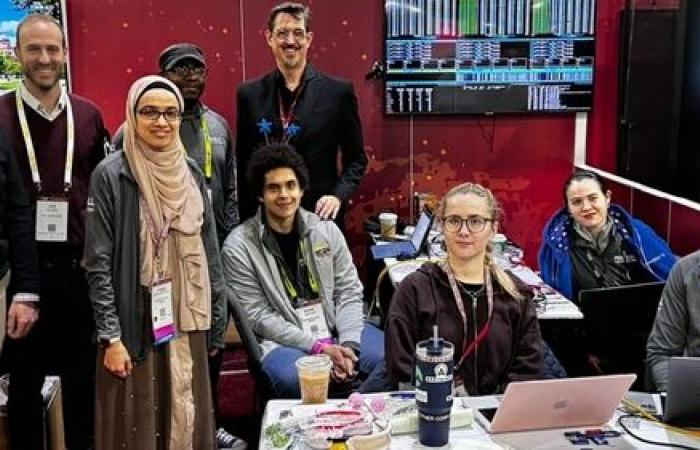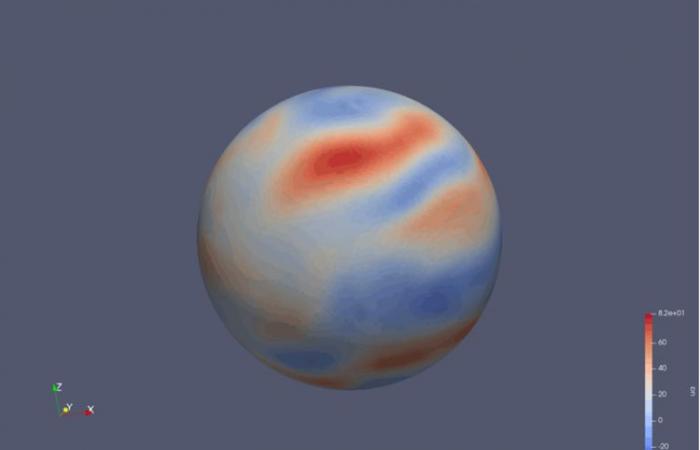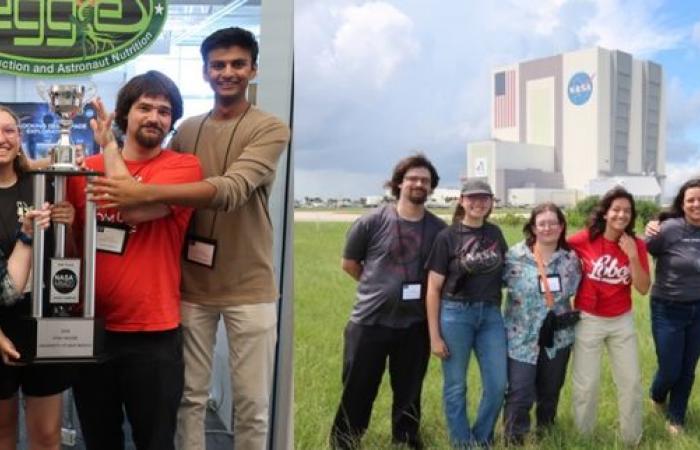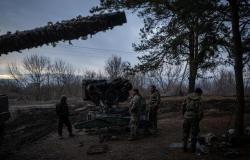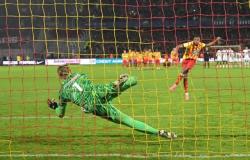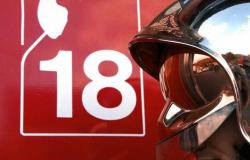In collaboration with Dell Technologies and NASA, undergraduate computer science students from the University of New Mexico (UNM) recently excelled in two major competitions. These teams exemplify UNM's commitment to preparing New Mexico students for high-tech careers in advanced computing and space technology.
Roadrunners: Supercomputer Competition
The six-month supercomputer competition concluded with a 48-hour hackathon in Atlanta. From left: Dell representatives Bryan Bianchi and Luis Marin, along with the UNM Roadrunner team.
In November, the UNM Roadrunners team competed in the International Student Cluster Competition at Supercomputing 2024 in Atlanta. The team had the opportunity to compete against some of the most prestigious universities in the world, earning second place among American teams and eighth place overall. The Roadrunner team embodies New Mexico's history of technological innovation and diversity. It prides itself on including members from groups historically underrepresented in the supercomputing field.
Global climate model produced during the hackathon by Saskia Trefethen from the Roadrunner team.
The industry partnership has been crucial to the success of the Roadrunners. They were fortunate to be sponsored by Dell Technologies, which provided a supercomputer for the competition, allowing the team to work with cutting-edge hardware. Penguin Solutions and Intersect360 Research also supported the team this year, covering all other competition-related costs, including transportation to the conference, meals and other expenses. With these strong partnerships and their own technical expertise, the Roadrunner team is already preparing for a new competition in 2025, with the ambition to improve its performance.
The team was supervised by Troy Redfearn and Alexandra Knigge (Advanced Research Center) as well as Nicholas Bacon (doctoral student at the Scalable Systems Lab). Associate Professor Matthew Fricke supervised the team.
Although several team members are close to finishing their studies, Fricke is already starting to put together a new team for 2025.
Chili House: NASA MINDS Competition – Kennedy Space Center
Last August, the Chili House team won the grand prize in the NASA MINDS 2024 (MUREP Innovative New Designs for Space) competition, marking their second victory at this prestigious competition since 2021.
NASA MINDS challenges university teams to design solutions supporting NASA's Artemis program and future space exploration. The Chili House team repurposed a broken and abandoned 3D printer to create a robot gardener capable of autonomously growing crops such as Hatch green chili peppers. Sensors attached to the crops allow the system to know when plants need attention. Robotic agriculture, like the solution developed by the students, is essential for long-duration missions on space stations and for the colonization of the Moon, Mars, and beyond. NASA astronauts have expressed a preference for spicy foods, including New Mexico chili peppers during extended missions, because microgravity dulls the sense of taste. This initiative aims not only to improve the flavor of meals, but also to contribute to the psychological well-being of astronauts by providing them with living plants that establish a sense of normalcy and a connection with the Earth.
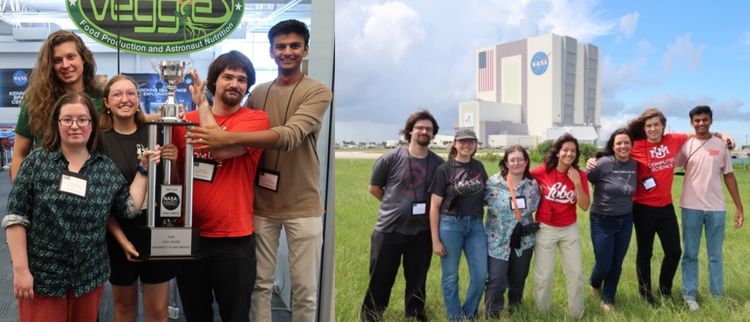
Members of the Chili House team at the Kennedy Space Center to accept the grand prize. (Right) From left: Carter Frost, Trinity Griffus, Tatyana Falkowsky, Stefany Olivas, Andrei Popa-Simil, and Shrey Poshiya.
In August, the Chili House team traveled to the Kennedy Space Center to attend the NASA MINDS Awards Ceremony and present their work to NASA engineers and researchers. They plan to compete again in 2025, building on their previous successes and further developing their robotic gardening system. The team's work also highlights the importance of space colonization, which provides opportunities for exploration, technological advancement and solutions to global issues such as food security.
The Chili House team is made up of several UNM departments: Trinity Griffus (team leader) and Louis Shogo Hight from Biology, Shrey Poshiya, Carter Frost, and Andrei Popa-Simil from Computer Science, Tatyana Falkowsky and Pascale Allred in biochemistry, and Sabrina Falkowsky in economics. The team was advised by Professor and Assistant Vice President for Research David Hanson, as well as Dr. Fricke at the Moses Biological Computation Lab, with support from Laura Green (Biology) and Jacob “Pepperseed” Torres (Moon Chile Challenge).
“The students I work with at UNM continually surprise me with their dedication, perseverance and talent. They are the driving force behind New Mexico’s bright future in high tech – I am very proud of the students on both teams,” Fricke said.
The Roadrunner and Chili House teams exemplify the importance of hands-on experience in preparing students for careers in advanced technology. They embody UNM’s mission to prepare its graduates to address critical global challenges. Whether advancing supercomputing applications in climate science, vaccine development, or AI, or designing sustainable technologies for space exploration, these students continue to push the boundaries of innovation and excellence.
It's fascinating to see how initiatives like those of the Roadrunner and Chili House teams not only train students, but also shape a culture of sustainable innovation. By integrating real problems related to space and technology, they improve their training while responding to contemporary challenges. This synergy between education and industry could undoubtedly transform our approach to the major challenges of tomorrow, particularly those linked to space exploration and food security. We are on the cusp of technological possibilities that could redefine our existence.
Original article written by: First name Last name.
Our editors use AI to help them deliver fresh items from trusted sources to our users. If you find any image or content that is inappropriate, please contact us via DMCA form and we will promptly remove it. / Our editors use AI to help them offer our readers fresh articles from reliable sources. If you find an image or content inappropriate, please contact us via the DMCA form and we’ll remove it promptly.
- -
